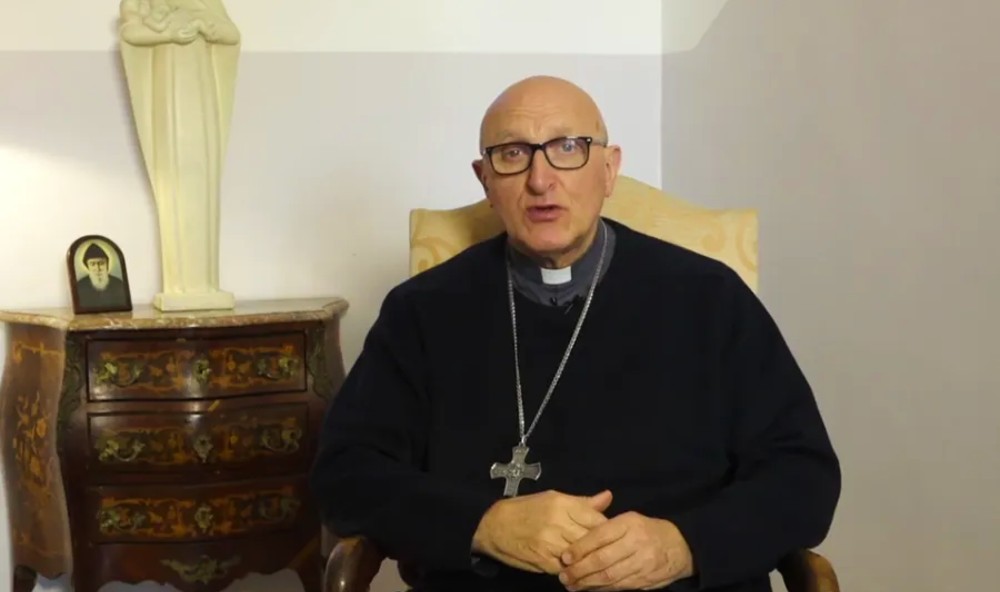We ask you, urgently: don’t scroll past this
Dear readers, Catholic Online was de-platformed by Shopify for our pro-life beliefs. They shut down our Catholic Online, Catholic Online School, Prayer Candles, and Catholic Online Learning Resources—essential faith tools serving over 1.4 million students and millions of families worldwide. Our founders, now in their 70's, just gave their entire life savings to protect this mission. But fewer than 2% of readers donate. If everyone gave just $5, the cost of a coffee, we could rebuild stronger and keep Catholic education free for all. Stand with us in faith. Thank you.Help Now >
Pakistani Candidate for Prime Minister defends that nation's controversial anti-blasphemy law
FREE Catholic Classes
A candidate for prime minister in Pakistan's upcoming general election has defended the country's controversial blasphemy laws, which have been used to harass, jail, and kill members of religious minorities disproportionately.

Highlights
Catholic Online (https://www.catholic.org)
7/11/2018 (6 years ago)
Published in Living Faith
Keywords: Pakistani, prime minister, candidate endorses
Islamabad, Pakistan, (CNA/EWTN News) - Imran Khan, chairman of Pakistan Tehreek-e-Insaf, a centrist party, said he fully supports the blasphemy law of the Pakistan Penal Code. The statement was made July 7 after giving an address at the Ulema and Mashaikh Conference at Golra Sharif in the capital of Pakistan, Islamabad.
"We are standing with Article 295c and will defend it," said Khan, according to the Guardian.
A former member of the National Assembly of Pakistan, Khan will be considered for prime minister along with Shehbaz Sharif of the Pakistan Muslim Leage (N) and Bilawal Zardari of the Pakistan Peoples Party.
The general election will take place July 25. PML-N is forecast to win the election, though there have been allegations of vote rigging in favor of PTI.
Pakistan's blasphemy laws impose strict punishment on those who desecrate the Quran or who defame or insult Muhammad. Pakistan's state religion is Islam, and around 97 percent of the population is Muslim.
Although the government has never executed a person under the blasphemy law, accusations alone have inspired mob and vigilante violence.
Blasphemy laws are reportedly used to settle scores or to persecute religious minorities; while non-Muslims constitute only 3 percent of the Pakistani population, 14 percent of blasphemy cases have been levied against them.
Many of those accused of blasphemy are murdered, and advocates of changing the law are also targeted by violence.
In 2011 the Punjab governor Salmaan Taseer, a Muslim critic of the blasphemy laws, was assassinated. Shahbaz Bhatti, a Catholic and the only Christian in Pakistan's cabinet, was also assassinated the same year by militant supporters of the blasphemy laws. Bhatti's cause for beatification was opened by the Diocese of Islamabad-Rawalpindi in 2016.
The blasphemy laws were introduced between 1980 and 1986. The National Commission for Justice and Peace said over 1,300 people were accused under this law from 1987 until 2014. The Centre for Research and Security Studies reported that at least 65 people have been killed by vigilantes since 1990.
Pakistan's authorities have consistently failed to implement safeguards on behalf of religious minorities, despite numerous policies in favor of economic and physical protections for members of non-Muslim religions.
In 2013, PML-N, the governing party, promised a quota for jobs in the educational institutes and the public sector for members of religious minorities. That same year, the PPP discussed an Equality Commission to monitor job quotas in Sindh.
After Muslim extremists attacked All Saints Church in Peshawar, killing over 70 people in 2014, Chief Justice Tassaduq Jillani issued an eight-point decree to improve access to jobs, education, and protective forces.
However, none of these safeguards have moved beyond verbal affirmation into action.
Last year, Bethel Memorial Methodist Church in Quetta was attacked by two suicide bombers. The attack killed 9 people and injured 35 others, according to the New York Times.
A member of the Implementation of Minority Rights Forum said government support was not made available after the attack.
"The government was not ready to even disburse compensation cheques among families, and none of the minority parliamentarians were interested in making noise about it," said Imtiaz, according to Dawn, Pakistan's largest English-language newspaper.
---
'Help Give every Student and Teacher FREE resources for a world-class Moral Catholic Education'
Copyright 2021 - Distributed by Catholic Online
Join the Movement
When you sign up below, you don't just join an email list - you're joining an entire movement for Free world class Catholic education.
-

-
Mysteries of the Rosary
-
St. Faustina Kowalska
-
Litany of the Blessed Virgin Mary
-
Saint of the Day for Wednesday, Oct 4th, 2023
-
Popular Saints
-
St. Francis of Assisi
-
Bible
-
Female / Women Saints
-
7 Morning Prayers you need to get your day started with God
-
Litany of the Blessed Virgin Mary
Meta's New Commitment to Free Speech and Its Potential Impact on Online Discourse
-

Pope Francis Accepts Resignation of Bishop Dominique Rey of Frejus-Toulon
-

Bound by Betrayal: Katie's Struggle with Lust, Lies, and Redemption
-
John: A Story of Addiction, Hopelessness, and the Search for Redemption
-
Science vs. Faith: The Battle for Truth and Hope
Daily Catholic
 Daily Readings for Wednesday, January 08, 2025
Daily Readings for Wednesday, January 08, 2025 St. Thorfinn: Saint of the Day for Wednesday, January 08, 2025
St. Thorfinn: Saint of the Day for Wednesday, January 08, 2025 Prayer for a Blessing on the New Year: Prayer of the Day for Tuesday, December 31, 2024
Prayer for a Blessing on the New Year: Prayer of the Day for Tuesday, December 31, 2024- Daily Readings for Tuesday, January 07, 2025
- St. Raymond of Pennafort: Saint of the Day for Tuesday, January 07, 2025
- St. Theresa of the Child Jesus: Prayer of the Day for Monday, December 30, 2024
![]()
Copyright 2024 Catholic Online. All materials contained on this site, whether written, audible or visual are the exclusive property of Catholic Online and are protected under U.S. and International copyright laws, © Copyright 2024 Catholic Online. Any unauthorized use, without prior written consent of Catholic Online is strictly forbidden and prohibited.
Catholic Online is a Project of Your Catholic Voice Foundation, a Not-for-Profit Corporation. Your Catholic Voice Foundation has been granted a recognition of tax exemption under Section 501(c)(3) of the Internal Revenue Code. Federal Tax Identification Number: 81-0596847. Your gift is tax-deductible as allowed by law.







 Daily Readings for Wednesday, January 08, 2025
Daily Readings for Wednesday, January 08, 2025 St. Thorfinn: Saint of the Day for Wednesday, January 08, 2025
St. Thorfinn: Saint of the Day for Wednesday, January 08, 2025 Prayer for a Blessing on the New Year: Prayer of the Day for Tuesday, December 31, 2024
Prayer for a Blessing on the New Year: Prayer of the Day for Tuesday, December 31, 2024

